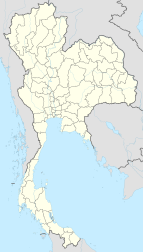Buri Ram
|
Town of Buriram บุรีรัมย์ |
|
|---|---|
| Town | |

Romburi Park, Buriram Town
|
|
| Location in Thailand | |
| Coordinates: 14°59′39″N 103°06′08″E / 14.99417°N 103.10222°E | |
| Country | Thailand |
| Province | Buriram Province |
| Amphoe | Mueang Buriram |
| Tambon | Tambon Nai Mueang |
| Founded | 1936 |
| Government | |
| • Type | Thesaban |
| • Mayor | Kamon Rueangsuksiwong |
| Area | |
| • Total | 2 sq mi (6 km2) |
| Elevation | 535 ft (163 m) |
| Population (April 2010) | |
| • Total | 28,283 |
| • Metro density | 12,162.2/sq mi (4,695.84/km2) |
| Time zone | ICT (UTC+7) |
| Postal code | 31000 |
| Area code(s) | 044 |
| Website |
Official website |
Buriram (Thai: บุรีรัมย์, rtgs: Buri Ram, pronounced [bū.rīː rām], literally means city of happiness) is a town (thesaban mueang) in Thailand, former capital of Buriram Province, about 410 km northeast of Bangkok. The town covers the whole tambon Nai Mueang of Mueang Buriram District. In 2012 it had a population of 27,862. It is also the location of the venue, New I-Mobile Stadium.
Almost a thousand years ago, the present-day Buriram area was part of the Khmer Empire. Many ruins from that time attest to the destruction. The most significant of them is on an extinct volcano and is protected in the Phanom Rung Historical Park. According to inscriptions found, Buriram's ruler recognized the hegemony of the Khmer Empire's emperor. Before the ascent of Bangkok, little was known about Buriram. In the early Bangkok Period, in the early 19th century, the town originally called Muang Pae, was renamed Buriram. Then it came under Thai rule. After administrative reforms in the late 19th century, Buriram was incorporated into Siam as a province.
There are 18 chumchons (villages) (Thai: ชุมชน) in Buriram.
Buriram is in the centre of Buriram Province. Buriram doesn't have any important rivers, but it has a creek, Huai Chorakhe Mak. Important waters in the town such as Buriram Moat (or Khlong Lalom), Nong Prue, Huai Chorakhe Mak Reservoir and Huai Talat Reservoir.
The town is on the north-eastern railway line, and also has a regional airport, Buriram Airport. Much of the local economy is still agricultural and the tourist industry that is a prominent feature in much of the rest of the country has yet to make a significant impact. Key agricultural crops include rice and cassava. The main languages spoken in Buriram are central Thai, Lao, and Khmer.
...
Wikipedia

